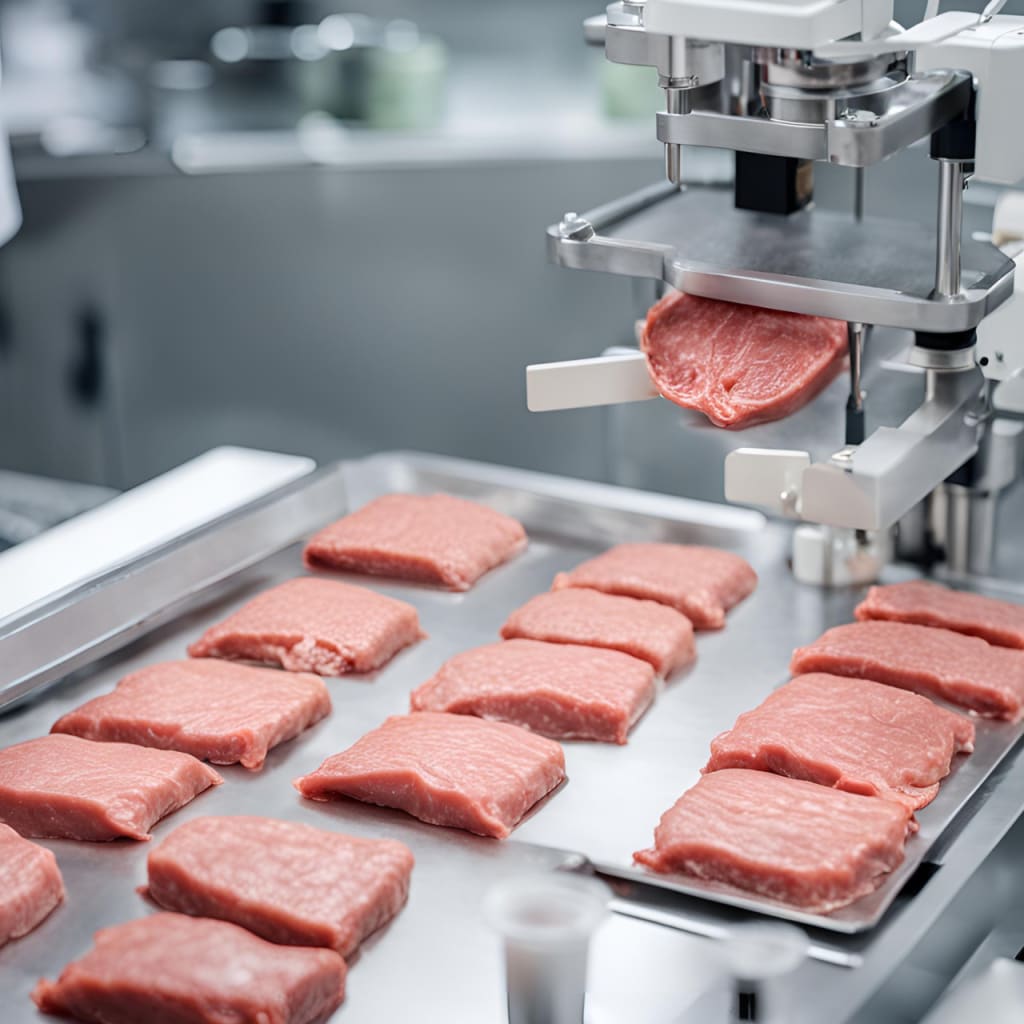Exploring the Future of Meat: From Lab to Table
Redefining the Dinner Plate

Picture a world where meat isn't sourced from slaughtered animals, but rather cultivated from live tissue grown cell by cell in laboratory vats. It's a future that's not as far-fetched as it may seem, and it's prompting us to reconsider our relationship with food and the creatures that provide it.
Cultivated meat, also known as lab-grown meat, is a groundbreaking process that involves taking cells from animals like cows, chickens, or pigs and stimulating their growth outside the body in specialized machines called bioreactors. This innovative approach allows us to enjoy the taste and texture of meat without the ethical and environmental implications associated with traditional livestock farming.
Unlike plant-based alternatives such as Impossible Foods and Beyond Meat, which aim to mimic the taste of meat using plant-derived ingredients, cell-based meat is actual animal tissue. The journey of cultivated meat began nearly a decade ago when the first cultured meat burger was taste-tested on live television. However, it's only been in the past few years that research and investment in this field have truly taken off.
Advocates of cultivated meat argue that it offers a solution to many of the worst problems associated with the livestock industry, including land and water use, pollution, greenhouse gas emissions, and animal suffering. By producing meat in controlled environments, cultured meat has the potential to address these pressing issues while still satisfying our appetite for animal protein.
However, critics raise valid concerns about the environmental impact of scaled-up production and the ethical implications of growing meat in laboratories. Some argue that instead of investing billions of dollars in developing cultured meat, we should focus on promoting plant-based diets or even eliminating meat consumption altogether.
Yet, amidst these debates lies a fundamental question: How will the emergence of cultured meat reshape our relationship with food? One company at the forefront of this innovation is Culture Biosciences, which operates a network of bioreactors for hire. These bioreactors serve as incubators for growing various proteins and engineered microbes, including cultured meat.
The process of producing cultivated meat begins with a biopsy, a sample of cells taken from an animal. These cells are then cultured and multiplied in flasks containing the necessary nutrients for growth. Once a sufficient density of cells is achieved, they are transferred to larger bioreactors where they continue to proliferate until they can be harvested and processed into food products.
While the potential of cultivated meat is promising, several challenges remain. The process must become more consistent, automated, and cost-effective to compete with traditional meat production methods. Safety concerns also loom large, as the perfect conditions for cell growth in bioreactors also create an ideal environment for contaminants.
Despite these hurdles, the future of meat production could take various paths. Some envision large-scale facilities akin to industrial breweries, while others foresee a proliferation of artisanal producers offering unique variations of cultured meat. There's even speculation about the possibility of home-based bioreactors, allowing consumers to grow their own meat in their kitchens.
One particularly intriguing vision comes from Dutch researcher Cor van der Weele, who conducted focus groups to explore consumer attitudes toward cultured meat. Participants expressed a desire for locally sourced meat production, with some suggesting a "pig in the backyard" model where starter cells are obtained from community-owned animals.
While this vision may seem fantastical, it underscores the potential for cultured meat to revolutionize not only how we produce food but also how we perceive our relationship with animals and the environment. As technology continues to advance, the boundaries between science fiction and reality blur, opening up new possibilities for the future of meat.
As we navigate these uncharted territories, it's essential to engage in discussions about the ethical, environmental, and societal implications of cultured meat. By considering the broader implications of technological innovation, we can shape a future where our food choices align with our values and aspirations for a more sustainable world.
About the Creator
Enjoyed the story? Support the Creator.
Subscribe for free to receive all their stories in your feed. You could also pledge your support or give them a one-off tip, letting them know you appreciate their work.





Comments
Test is not accepting comments at the moment
Want to show your support? Send them a one-off tip.